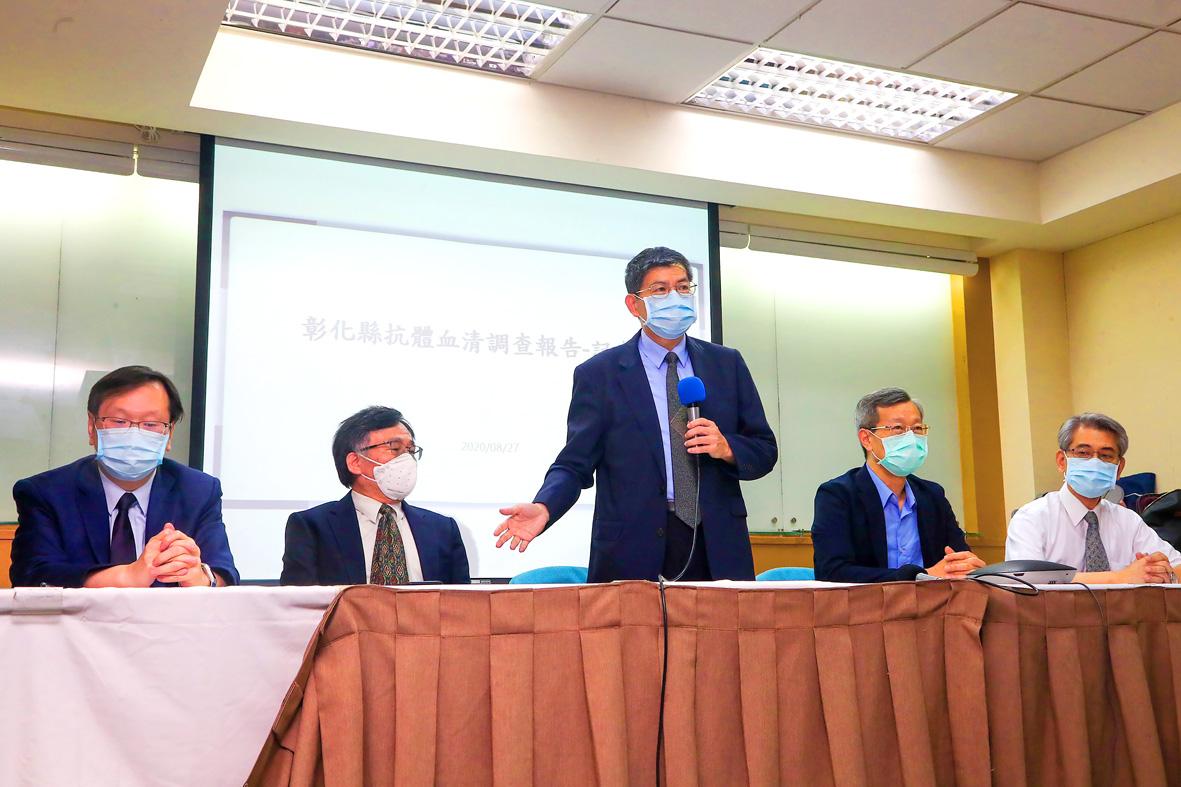The results of a controversial antibody study in Changhua County, which National Taiwan University (NTU) public health researchers announced yesterday, showed the success of the Central Epidemic Command Center’s (CECC) disease prevention efforts, but not the need for universal screening.
The research was mainly conducted by the county government, while NTU’s College of Public Health assisted with data analysis, former college dean Chan Chang-chuan (詹長權) told a news conference convened in Taipei to announce the preliminary results.
Chan had been calling for mass testing for COVID-19 to identify asymptomatic patients, but the CECC had not taken his advice.

Photo: CNA
Of the 4,841 high-risk people whose blood samples were analyzed, only four were confirmed positive, a rate of 8.3 positive people per 10,000, Changhua Public Health Bureau Director Yeh Yen-po (葉彥伯) said.
Those who were inspected included confirmed COVID-19 patients and those with high risk of becoming patients, including medical personnel, police officers who helped with disease prevention measures and those under home quarantine after returning from the US, Europe and China, he said.
The study demonstrates that the average citizen does not need an antibody test, Yeh said, adding that the test results prove that Changhua is safe.
Taiwan’s first COVID-19 patient, an unlicensed taxi driver who also became the nation’s first death from the pandemic, was in the county, but the rest of the nation does not need to worry now that Changhua is safe, he added.
Since April, the bureau has bumped heads with the CECC for conducting pathology testing not approved by the center.
An Aug. 15 test that discovered the nation’s 485th case — a Taiwanese teen living in the US who arrived on Aug. 5 for a family visit — was touted as proof that the nation needed to implement general screening for COVID-19, increasing tensions between the CECC and the county government.
At the news conference, Centers for Disease Control Deputy Director-General Chuang Jen-hsiang (莊人祥), the CECC’s spokesman, thanked the research team for announcing the results despite the challenges, saying that the research clarified whether the nation’s disease prevention system has any loopholes.
The results show that the CECC’s policy of using home quarantine and home isolation to prevent transmission of the virus by asymptomatic patients works, Chuang said.
Asked to comment on the results of the mass testing, Premier Su Tseng-chang (蘇貞昌) said it showed that the collaborative efforts of all parts of society to prevent the spread of the disease paid off.
It also showed that mass testing is unnecessary, he added.
Hopefully, people would learn their lesson and follow the CECC’s instructions, he said, adding that in disease prevention, unity is strength.
Regarding controversy surrounding the funding sources and testing agents for the research, Chan said that the school’s study was academic, as its contract with the county government said that it could provide assistance if public health evaluations were needed.
Their study had been approved by NTU’s Institutional Review Board, he added.
NTU provided the funding to purchase the antibody serum solutions and the research team helped analyze the serum samples, Chan said, adding that it did not collect any of the blood samples.
Additional reporting by Sean Lin, Wu Po-hsuanand Lin Hui-chin

Conflict with Taiwan could leave China with “massive economic disruption, catastrophic military losses, significant social unrest, and devastating sanctions,” a US think tank said in a report released on Monday. The German Marshall Fund released a report titled If China Attacks Taiwan: The Consequences for China of “Minor Conflict” and “Major War” Scenarios. The report details the “massive” economic, military, social and international costs to China in the event of a minor conflict or major war with Taiwan, estimating that the Chinese People’s Liberation Army (PLA) could sustain losses of more than half of its active-duty ground forces, including 100,000 troops. Understanding Chinese

The Ministry of Foreign Affairs (MOFA) yesterday said it is closely monitoring developments in Venezuela, and would continue to cooperate with democratic allies and work together for regional and global security, stability, and prosperity. The remarks came after the US on Saturday launched a series of airstrikes in Venezuela and kidnapped Venezuelan President Nicolas Maduro, who was later flown to New York along with his wife. The pair face US charges related to drug trafficking and alleged cooperation with gangs designated as terrorist organizations. Maduro has denied the allegations. The ministry said that it is closely monitoring the political and economic situation

UNRELENTING: China attempted cyberattacks on Taiwan’s critical infrastructure 2.63 million times per day last year, up from 1.23 million in 2023, the NSB said China’s cyberarmy has long engaged in cyberattacks against Taiwan’s critical infrastructure, employing diverse and evolving tactics, the National Security Bureau (NSB) said yesterday, adding that cyberattacks on critical energy infrastructure last year increased 10-fold compared with the previous year. The NSB yesterday released a report titled Analysis on China’s Cyber Threats to Taiwan’s Critical Infrastructure in 2025, outlining the number of cyberattacks, major tactics and hacker groups. Taiwan’s national intelligence community identified a large number of cybersecurity incidents last year, the bureau said in a statement. China’s cyberarmy last year launched an average of 2.63 million intrusion attempts per day targeting Taiwan’s critical

AGING: As of last month, people aged 65 or older accounted for 20.06 percent of the total population and the number of couples who got married fell by 18,685 from 2024 Taiwan has surpassed South Korea as the country least willing to have children, with an annual crude birthrate of 4.62 per 1,000 people, Ministry of the Interior data showed yesterday. The nation was previously ranked the second-lowest country in terms of total fertility rate, or the average number of children a woman has in her lifetime. However, South Korea’s fertility rate began to recover from 2023, with total fertility rate rising from 0.72 and estimated to reach 0.82 to 0.85 by last year, and the crude birthrate projected at 6.7 per 1,000 people. Japan’s crude birthrate was projected to fall below six,